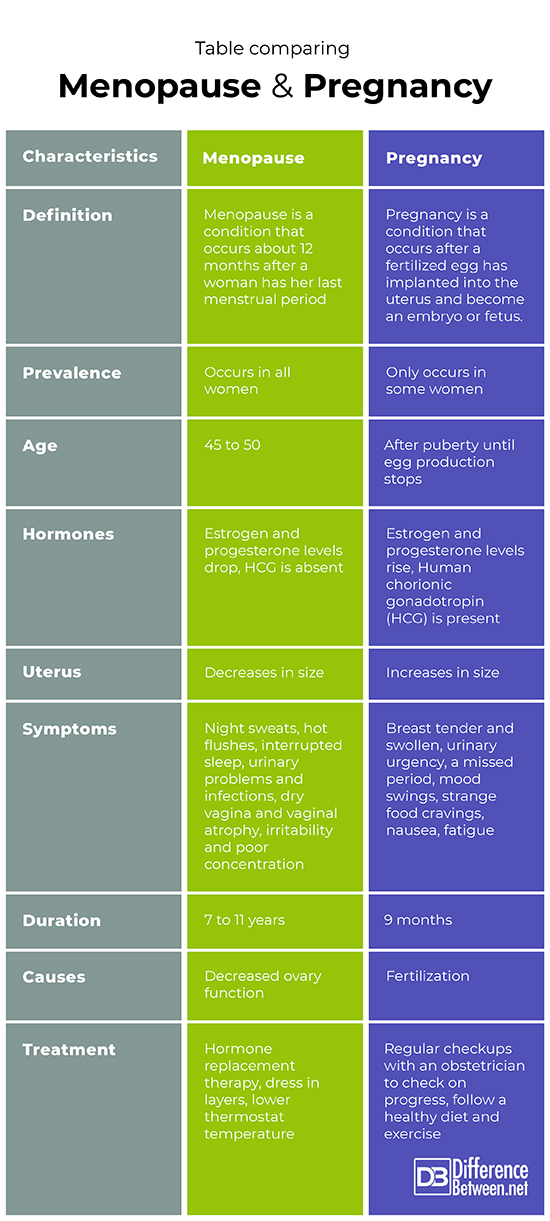
Symptoms of Pregnancy vs. Menopause: A Comprehensive Guide
Pregnancy and menopause are two distinct phases in a woman’s life, each characterized by a unique set of physical and emotional changes. While some symptoms may overlap, it’s crucial to differentiate between these two conditions to ensure proper medical care and support. This comprehensive guide will delve into the key symptoms of pregnancy and menopause, highlighting their similarities and differences to aid in accurate self-assessment.
Symptoms of Pregnancy
Pregnancy is a transformative journey that brings about a myriad of physical and hormonal changes. The most common symptoms of pregnancy include:
- Missed period: The absence of a menstrual period is often the first indication of pregnancy.
- Tender breasts: Increased blood flow to the breasts can cause tenderness, swelling, and a darkening of the areolas.
- Nausea and vomiting: Morning sickness, also known as nausea and vomiting, typically occurs during the first trimester.
- Fatigue: Extreme tiredness is a common symptom throughout pregnancy due to hormonal changes and increased blood volume.
- Frequent urination: The growing uterus puts pressure on the bladder, leading to more frequent urination.
- Constipation: Progesterone, a hormone produced during pregnancy, can slow down digestion, causing constipation.
- Mood swings: Hormonal fluctuations can trigger mood swings, irritability, and emotional sensitivity.
- Food cravings and aversions: Changes in taste and smell can lead to cravings for certain foods and an aversion to others.
- Weight gain: As the baby grows, the mother’s weight will gradually increase.
- Abdominal pain: Mild cramping and lower back pain can occur as the uterus expands.
Symptoms of Menopause
Menopause marks the end of a woman’s reproductive years and is characterized by a decline in estrogen and progesterone levels. The symptoms of menopause can vary widely and may include:
- Hot flashes: Sudden feelings of heat, sweating, and flushing that can last for a few minutes or longer.
- Night sweats: Hot flashes that occur during sleep, causing discomfort and sleep disturbances.
- Vaginal dryness: Reduced estrogen levels can lead to thinning and drying of the vaginal tissues.
- Irregular periods: As estrogen levels decline, menstrual periods become less frequent and eventually cease.
- Mood swings: Hormonal changes can trigger mood swings, irritability, and anxiety.
- Sleep disturbances: Hot flashes and night sweats can disrupt sleep patterns.
- Weight gain: Changes in metabolism and hormonal balance can contribute to weight gain.
- Thinning hair and dry skin: Reduced estrogen levels can affect hair and skin health.
- Osteoporosis: Declining estrogen levels can increase the risk of osteoporosis, a condition that weakens bones.
- Cognitive changes: Some women may experience mild cognitive changes, such as memory lapses or difficulty concentrating.
Overlapping Symptoms
While pregnancy and menopause have distinct symptom profiles, some symptoms can overlap, making it challenging to differentiate between the two conditions. These overlapping symptoms include:
- Fatigue: Both pregnancy and menopause can cause extreme tiredness.
- Mood swings: Hormonal fluctuations can trigger mood swings in both conditions.
- Weight gain: Weight gain can occur during pregnancy and menopause due to hormonal changes.
- Sleep disturbances: Hot flashes and night sweats can disrupt sleep in menopause, while hormonal changes and physical discomfort can affect sleep during pregnancy.
Distinguishing Between Pregnancy and Menopause
To accurately distinguish between pregnancy and menopause, it’s important to consider the following factors:
- Age: Pregnancy is typically associated with women of reproductive age, while menopause occurs around the age of 50.
- Menstrual history: Missed periods are a common sign of pregnancy, while irregular or absent periods are characteristic of menopause.
- Other symptoms: The presence of symptoms such as nausea, vomiting, breast tenderness, and abdominal pain is more suggestive of pregnancy.
- Pregnancy test: A pregnancy test can confirm or rule out pregnancy by detecting the presence of human chorionic gonadotropin (hCG) in the urine or blood.
- Medical evaluation: If there is uncertainty about the cause of symptoms, a medical evaluation is recommended to determine the underlying condition.
Importance of Accurate Diagnosis
Accurate diagnosis is crucial for appropriate medical care and support. If pregnancy is confirmed, prenatal care and monitoring are essential to ensure the health of both the mother and the baby. On the other hand, if menopause is diagnosed, hormone replacement therapy or other treatments may be recommended to alleviate symptoms and prevent long-term health risks.
Conclusion
Pregnancy and menopause are distinct phases in a woman’s life with unique sets of symptoms. While some symptoms may overlap, careful consideration of factors such as age, menstrual history, and other symptoms can help differentiate between the two conditions. Accurate diagnosis is essential for proper medical care and support, ensuring the well-being of women during these significant life transitions.